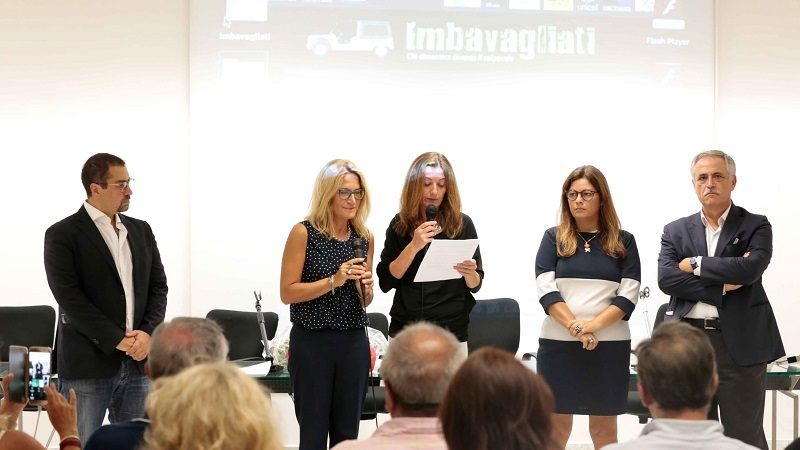Journalists all over Europe were facing the same problems of harassment and intimidation and it was important to build bridges across journalistic communities to fight organised crime and injustice while speaking for truth and democracy, The Shift News’ journalist Caroline Muscat said at the journalism festival Imbavagliati (gagged) in Italy.
Muscat was awarded the Pimentel Fonseca 2018 journalism prize,”for her tireless search for the truth through investigative journalism”.
This year, the award was dedicated to assassinated journalist Daphne Caruana Galizia. Speaking during the ceremony, Muscat said those who killed Caruana Galizia wanted to send a message to the country that they were untouchable. “We set up The Shift News because we wanted to send a strong message back that journalists cannot be silenced,” Muscat said.
Muscat thanked Italian journalists for their solidarity and recognising the struggle of Maltese journalists. She pointed out that the Maltese independent media were facing “monumental challenges”.
“Daphne was killed for doing her job. Now, we must resist our government’s efforts to bury her name as well. It is a struggle for justice for Daphne and it is also a struggle for press freedom and democracy in Malta,” she said.
There were very few independent journalists in Malta as the vast majority work for media owned by the political Parties and the State broadcaster was controlled by the Party in government.
The government spent thousands of euro in online advertising to “drown out our voice with propaganda”.
We can no longer speak of whether a journalist’s murder could happen again, but of when.
Muscat spoke of Caruana Galizia’s work, saying she investigated organised crime and corruption at the highest levels of government. None of the politicians she investigated were questioned by the police in relation to her assassination, Muscat added.
Caruana Galizia felt that she had no option but to continue fighting – regardless of the isolation, sacrifice and hate. In the same way, “we have no option but to fight back,” Muscat said.
Malta was at an important crossroads – activists calling for justice were targeted, investigative journalists were discredited, insulted and dehumanised.
Muscat also read out a message from Corinne Vella, Caruana Galizia’s sister, who said journalists were threatened and killed because “criminals want their criminal actions and interests to remain covered up”.
She thanked the organisers for dedicating the prize to her sister whose murder raised global concerns about press freedom, corruption and rule of law in Malta, and also that Europe was no longer safe for journalists.
In fact, soon after Caruana Galizia was murdered, Slovak journalist Jan Kuciak was killed with his fiancee Martina Kusnirova at their apartment block. “We can no longer speak of whether a journalist’s murder could happen again, but of when,” Vella said.
Dedicating this year’s Pimentel Fonseca prize to Daphne “will raise awareness of the need to protect journalists and will help inspire the changes society needs. Journalists needed to be protected but were not because “protection mechanisms are inadequate,” Vella said.
National mechanisms were not enough to protect journalists and – even so – on a national level there were gaps. A journalist covering “transnational crime needs transnational protection” and should only need to raise an alarm once and “not do so by dying”.
Vella said it was unreasonable to expect journalists to be heroes who risked their lives for society but everyone had to pull their weight to live in a free society “We need to be active citizens ourselves and see to it that our States protect journalists properly by eliminating the the threats they face”.

Beppe Giuletti, President of the Italian national union of journalists FNSI.
The award is named after Eleonora Pimentel Fonseca, one of the leaders of the Neapolitan revolution and founder of the newspaper “Monitore Napoletano”, who died in Naples during the revolution of 1799.
Last year’s prize was collected by Carlos Bardem – brother of Oscar winner Javier – on behalf of his mother Pilar Bardem, legendary actress and an indefatigable civil rights activist.
The previous year, Djimi Elghalia, an activist for the rights of the Saharawi people was given the award for being the voice of a population that has always been fighting for independence.
The first edition of the prize was awarded in 2015 to Russian journalist Oksana Chelysheva of Novaya Gazeta, where she worked with Anna Politkovskaya and covered the political situation in Chechnya.
The Pimentel Fonseca Prize starts off the fourth edition of the International Journalism Festival called Imbavagliati (Gagged). The project was created by Désirée Klain, artistic director and president of the cultural association Periferie del Mondo – Periferia Immaginaria.
It was organised in cooperation with the Naples Tourism and Culture Division, Polis Foundation, under the Patronage of Unicef, Amnesty International, National Order of Journalists, National Italian Press Federation, Unitary Union of Journalists of Campania and Campania’s Order of Journalists.












